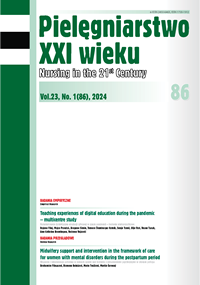Top management education needs - A case study of public health system in Slovenia
DOI:
https://doi.org/10.2478/pielxxiw-2024-0002Keywords:
education, management, training, public health institutions of SloveniaAbstract
TOP MANAGEMENT EDUCATION NEEDS – A CASE STUDY OF PUBLIC HEALTH SYSTEM IN SLOVENIA
Aim. The purpose of the research was to identify the gap in the existing educational content in Slovenia, which employees in the top management of public health institutions acquired during their education, and to propose a new educational program based on the analysis of the results.
Material and methods. Quantitative research method and descriptive work method were used. The survey was completed by
directors, expert directors and assistant directors for health care in public health institutions in Slovenia. The survey was sent to all employees in the top management of public health institutions in Slovenia (N = 216). For statistic analysis we use chi-square test and Kullback’s test.
Results. A total number of 146 (67.6%) fully completed questionnaires were analyzed. After reviewing the educational programs and the needs for additional education expressed by the respondents, we noted that there is no program in Slovenia that covers all the necessary content for quality work in top management. We can add that employees in the top management of public health institutions should be required to receive special education.
Conclusions. Based on the opinions expressed by the respondents, we propose the introduction of a one-year educational program that would include topics from economics, legislation, management, medicine and nursing.
References
1. Laznik G. Model kurikuluma izobraževanja vodstvenih delavcev javnih zdravstvenih Manuscript accepted: 07.11.2023 zavodov Slovenije (Doktorska disertacija). Novo mesto: Univerza v Novem mestu Fakulteta za zdravstvene vede; 2021.
2. Ivanko Š. Zgodovina organizacijske misli. Novo mesto: Fakulteta za organizacijske študije; 2015.
3. Kramar Zupan M. Menedžment vs. vodenje. Novo mesto: Fakulteta za poslovne in upravne vede; 2009.
4. Rozman R. Uvod v management v zdravstvenih organizacijah. Rozman VR, Kovač J, Filej B, Robida A (ur.). Management v zdravstvenih organizacijah Ljubljana: Lexpera, GV Založba; 2019, p. 63-115.
5. Starc J. Razvoj modela kurikuluma izobraževanja in usposabljanja slovenskih menedžerjev, zaposlenih v gospodarstvu (Doktorska disertacija). Kranj: Univerza v Mariboru, Fakulteta za organizacijske vede; 2008.
6. Rozman R, Kova J, Filej B, Robida A (ur.). Management v zdravstvenih organizacijah. Ljubljana: Lexpera, GV Založba.
7. Kovač J, Maze H. Raziskava managerskega dela v zdravstvenih organizacijah. [in:] Rozman R, Kovač J, Filej B, Robida A (Eds.). Management v zdravstvenih organizacijah Ljubljana: Lexpera, GV Založba; 2019, p. 45-60.
8. Mreža javne zdravstvene službe. Republika Slovenija. Retrieved from https://www. gov.si/teme/mreza-javne-zdravstvene-sluzbe/. 2019.
9. Madden, M. Soft-leadership competencies for today’s healthcare finance executives. Healthcare financial management. 2015; 69(5): 42-45.
10. Jankelova N, Joniakova Z, Romanova A. The need for management education of healthcare management employees. International Journal of Health Planning and Management. 2022; 37(1): 301-317. Retrieved from https://doi.org/10.1002/ hpm.3325.
11. Kramar Zupan M. Dejavniki uspešnosti menedžmenta sprememb v zdravstveni organizaciji. Revija za ekonomske in poslovne vede. 2020; 7(1): 3-24. Retrieved from https://fpuv.uni-nm.si/uploads/_custom/revija_eb/vol7no1/Revija_EB¬2020_V7N1_1.pdf.
12. Blažič M. Pomen teorije inteligentne kariere za karierni razvoj menedžerjev. In J. Starc (Ed.), Izzivi globalizacije in družbeno-ekonomsko okolje EU. Zbornik prispevkov: mednarodna znanstvena konferenca. Novo mesto; 16. maj 2019, p. 7-23. Novo mesto: Univerza v Novem mestu Fakulteta za ekonomijo in informatiko, Univerza v Novem mestu Fakulteta za poslovne in upravne ved.
13. Jermaniš M. Izobraževalna politika Evropske unije na področju izobraževanja odraslih. Sodobna pedagogika. 2020; 71(137): 84-101.
14. Kramar Zupan M, Erjavec K. Kompetence in potrebe po izobraževanju direktorjev slovenskih bolnišnic. Didactica Slovenica – Pedagoška obzorja. 2020; 35(1), 114¬131. Retrieved from http://www.pedagoska-obzorja.si/revija/Vsebine/PDF/DSPO _2020_35_01.pdf.
15. Careau E, Biba G, Brander R, et al. Health leadership education programs, best practices, and impact on learners’ knowledge, skills, attitudes, and behaviors and system change: a literature review. J. Healthc. Leadersh. 2014; 6: 39-50. Retrieved from https://www.dovepress.com/getfile.php?fileID=19989.
16. Vold T, Haave HM. Relevance of Adult Higher Education on Knowledge Management in the Healthcare Sector. The Electronic Journal of Knowledge Management. 2020; 18(3): 236-254. Retrieved from https://doi.org/10.34190/EJKM.18.03.004.
17. Ayatollahi H, Zeraatkar K. Factors influencing the success of knowledge management process in health care organisations: a literature review. Health. Info. Libr. J. 2020; 37: 98-117. https://doi.org/10.1111/hir.12285.
18. Flaig J, Alam A, Huynh J, et al. Examining How Formal Leadership Development Programs Positively Influence Hospital Leaders’ Individual Competencies and Organizational Outcomes – An Evidence-Based Literature Review. J. Healthc. Leadersh. 2020; 12: 69-83. https://doi.org/10.2147/JHL.S239676
19. Karsikas E, Meriläinen M, Tuomikoski AM, et al. Health care managers’ competence in knowledge management: A scoping review. Journal of Nursing Management. 2022; 30(5): 1168-1187.
20. Kakemam E, Liang Z, Janati A, et al. Leadership and Management Competencies for Hospital Managers: A Systematic Review and Best-Fit Framework Synthesis. J. Healthc Leadersh. 2020; 12: 59-68. https://doi.org/10.2147/JHL.S265825.
Downloads
Published
Issue
Section
License
Copyright (c) 2024 Author

This work is licensed under a Creative Commons Attribution 4.0 International License.




